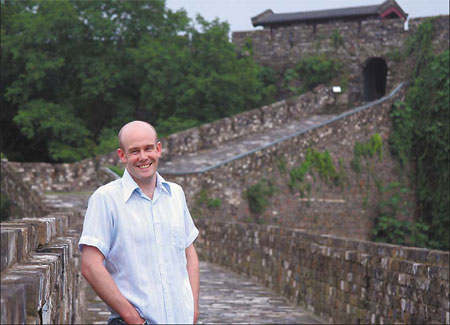When American Ross Doll started work at Nanjing-based MAP Magazine, he believed it was an opportunity to learn about the mindset of a transforming Chinese city.
But the 31-year-old found his experiences in Jiangsu's capital changed his own thinking, too.
While he was no stranger to China, or Nanjing, having moved to the city to teach English in 2005 before a yearlong stint in Yunnan province, he says it was only after he began working at MAP in 2007 that he began to understand how much he didn't know about his host city and its culture.
"I thought I knew but I didn't," Doll says.
"Working (at MAP) ... I've been able to meet people from all walks of life. What makes it so appealing is you can go through the magazine and get a sense of not only local life, but also local life through local people's eyes."
|

|
|
Reporter Ross Doll at the ancient city walls of Nanjing, a city he finds "most livable in China". [Courtesy of Ross Doll] |
One of his favorite stories that he wrote was an in-depth feature about Iris Chang, the acclaimed author who chronicled the horrors of the Japanese invasion of the city in The Rape of Nanking: The Forgotten Holocaust of World War II.
"It was a difficult story to do but very rewarding," Doll says.
Doll retraced Chang's steps through Nanjing during the several weeks she spent in the city researching her book.
"It's a much richer city and more fascinating place than I knew because I was mostly in my dorm for my first year."
He describes Nanjing culture as relatively conservative and laidback. The city, he adds, still has some healing to do since the Japanese invasion and civil war.
He says the most fascinating aspect of his job is discussing ways to appeal to vastly different cultures at every editorial meeting.
"Even though the job has been very trying and stressful, I can't understate how much I've learned about this culture," Doll says.
Doll works as one of three foreigners among a few dozen employees at MAP. Some of the major differences he found in the office are a tendency to write articles about advertisers, an emphasis on the magazine's appearance over its content and a compromising spirit to conflict resolution.
Doll points out that Nanjing is developed to the point that it is easy to find Western comforts but one can also live entirely locally.
"Being in a place that is less well known but also engaging has been a very rewarding experience," he says.
Doll says the relationships he has made are the most worthwhile part of his experience in the city, and his circle of friends is a roughly even mix of Chinese and expats.
He particularly enjoys Nanjing residents' enthusiasm for new experiences.
Doll recalls attending a concert at which about 100 students leapt on-stage during a visiting French band's performance.
"All these kids were jumping up and down like it was the Beatles playing," he says.
The stagehand had to ask the students to get off the platform, because it was about to collapse with a roughly 3-m drop beneath, he says.
"I think that as a foreigner here, you should really be grateful for that sense of newness It's China, but it's particularly Nanjing."
Doll adds the city's foreigners are more engaged with local culture than others living in megalopolises, such as Beijing, Shanghai and Guangzhou.
He recalls attending a Nanjing bar open mic night at which a young foreign woman, who spoke fluent Mandarin, performed erhu (two-stringed bowed instrument) and displayed exceptional skill at Chinese calligraphy.
The next week, he traveled to a Shanghai bar's open mic night, where "the foreigners could only speak a handful of Chinese words and it was like you picked up a handful of people from Portland, Oregon, and airlifted them to China."
The linguistic appeal of expat life in Nanjing was a great lure to his job. Editorial meetings are conducted in Mandarin and 60 percent of MAP's readership is Chinese.
The American started learning Chinese in 2005 at Middlebury College in Vermont, where he took a nine-week pledge to speak only Mandarin under penalty of expulsion.
But Doll didn't know a word of Chinese when he made his oath.
"When you don't speak the language, the language pledge is mostly about silence," he says. "I hated it because it was so hard but it's amazing what you learn."
After working in publishing in Seattle, he joined the Peace Corps in 2003, largely in the hope of coming to East Asia. He was delighted when he was assigned to Sichuan's provincial capital, Chengdu, but as the country was then gripped by SARS, he was instead sent to Romania for two years.
Soon after finishing his Eastern European stint, he pursued his fascination with China.
"I like Beijing and Shanghai, but I think that if you can experience living somewhere else, you should," Doll says. "Beijing is more aware of itself and documented by the media. I liked the idea of living somewhere less explored and self-conscious."
And, he says, he has never regretted his decision to dwell in Jiangsu's capital.
"Nanjing is possibly the most livable city in China," Doll says. "How lucky I feel to have had this experience."
(China Daily August 31, 2009)